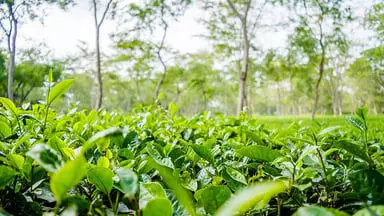Assam's Secret Biopiracy Economy: From Tea seeds to the strange trade in Gandhipuke

Nearly two centuries after British smuggled out wild tea seeds from Assam, spanned an empire that changed the global beverage industry, the region continues to bleed it. Natural wealth- this time through a shadowy biopiracy trade that most people barely know exists.
Currently, the usually known for its coal fields and illegal coal business, made headlines when two rival groups clashed violently over control of a bizzarely named commodity- Gandhipuke business.
This incident had cast a spotlight on a flourishing underground economy where Assam's rare plants, animals even obscure creatures are being harvested and exported to international markets, largely unchecked.
Assam — lush, green, and rich in natural resources — has long been a target of outside exploitationthe saga of biopiracy did not end there — it has merely changed form and grown in scale.
Even today, Assam remains a silent victim of systematic looting of its biodiversity. Beyond its famous resources — tea, oil, coal, gas, timber, and stone — there exists a hidden trade in lesser-known plants, animals, and even obscure natural products that fetch high prices in international markets.
The Hidden Bounty
The forests, wetlands, and rivers of Assam harbor an astonishing variety of biological wealth. Many of these — little known even to most Assamese — are quietly trafficked out of the state by well-organised networks.
Soap nuts (ritha) and hilikha (Terminalia chebula) — prized in Ayurvedic medicine and the global cosmetics industry.
🌸 Orchids and nahar (Mesua ferrea) flowers — sought after for perfumes, medicines, and ornamental gardening.
🌿 Black turmeric (Curcuma caesia) and katha (Acacia catechu) — used in traditional remedies and tanning.
Kola kosu- Assamese name
Taro, Cocoyam- English name
Colocasia esculenta
Family species- Araceae
From the animal world:
Elephants, rhinos, and tuskers — poached for ivory and horns.
Owls, snakes, and the feral horses (Equus Caballus)— smuggled for pets, rituals, or meat.
Aquatic delicacies like senga maas (snakehead fish), water snails, and even dogs — trafficked as food or medicine.
And now, a strange and controversial new addition: Gandhi puke — an exotic biological product whose name and nature have astonished the public.
This biopiracy is no accident; it thrives on a nexus of corruption and secrecy. Forest department officials, police, and even political figures have been named in investigative reports and local media for their roles in facilitating or shielding these trades.
Typically, poor villagers are used to collect or hunt the resources, which are then handed over to middlemen — often non-Assamese — who smuggle them into markets in Kolkata, Myanmar, China, or beyond. The profits rarely return to the local communities.
The Business Chain: A Well-Oiled Machine
The trade is run by tightly controlled networks:
Poor villagers and forest dwellers collect the items, often unaware of their true value.
Middlemen — typically non-Assamese — aggregate the products and move them across borders.
Buyers in Kolkata, Myanmar, Thailand, and China handle the high-value end of the market.
Local journalists and activists allege that the chain is protected by a nexus of forest officials, police, and political figures who extract bribes in exchange for turning a blind eye.
Why It Matters
For Assam, the unregulated exploitation of its biodiversity means: Loss of potential revenue from sustainable, legal trade.
Damage to ecosystems and species populations.
Continued marginalisation of local communities, who see little benefit from the wealth extracted from their lands
A Call for Action
Experts argue that Assam could turn its biodiversity into an asset through:
Stronger enforcement of existing wildlife and biodiversity laws.
Certification and promotion of legal, sustainable products in global markets.
Education and empowerment of local communities to take ownership of their natural heritage.
Until then, Assam’s quiet trade in black turmeric, soap nuts, orchids — and now even the mysterious Gandhi puke — will continue enriching others while the region bears the costs.
